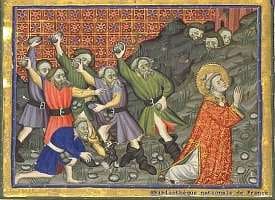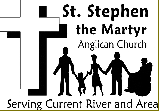Stephen, The First Christian Martyr

Stephen was a leader in the Jerusalem church and the first Christian martyr. He was one of seven men chosen and approved by both the Twelve and the community for the daily distribution of food. It is generally felt that the appointment and ordination of these seven men was the origin of the office of deacon.
How appropriate, therefore, that as an ecumenical project with other Current River churches, St. Stephen the Martyr Anglican Church initiated and participates in the Current River Churches’ Food Cupboard for the less fortunate in this area.
The story of Stephen relates to Jewish-Gentile conflicts in Jerusalem as well as opposition to the Christian mission within the city.
Stephen engaged in preaching and missionary work and was the impetus for the Christian mission out of Jerusalem into the Greek world. He spoke of Israel’s relation to the God of Isaac, Abraham and Jacob and confronted the Jews. He made the statement that he saw “the risen Jesus at God’s right hand.” For this, false accusations were made against him and he was stoned and buried in the presence of the young persecutor Paul.
Stephen is identified in Acts as a distinguished and reputable member of the community, full of the Spirit and power, and a man of wisdom. He performs signs and wonders and, like Joseph and Moses, he understood God’s purpose, and sought to clarify God’s plan for his audience. For this he died a Christ like death as the community was scattered beyond Jerusalem. As a person who died giving witness to the faith in Jesus, he is, by definition, a martyr! Ref: Acts 6:1 – 8:2.
Since the 4th century St. Stephen’s day has been observed on December 26, although in the modern liturgical calendar it can be observed on August 3, which is the date of the supposed discovery of his tomb by the priest Lucian in 415 CE. The events in the hymn Good King Wenceslas take place on St. Stephen’s day. St. Stephen is the patron of deacons and in the later Middle Ages he was invoked against headaches.


